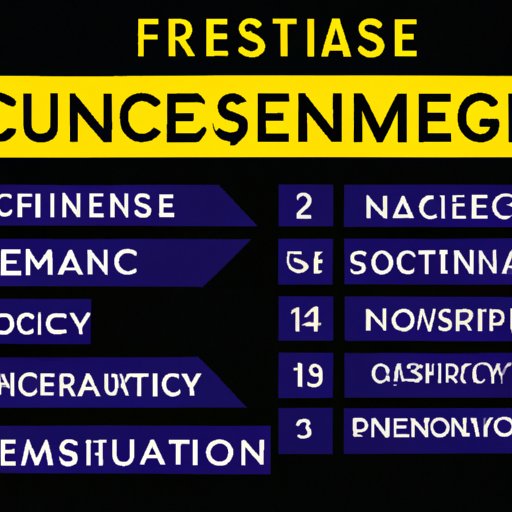Introduction
Forensic science is an exciting and rapidly growing field that combines science, technology, and criminal justice. A degree in forensic science can open up many career opportunities in law enforcement, crime scene investigation, laboratory analysis, and more. If you’re interested in pursuing a degree in forensic science, there are several steps you should take to ensure you’re prepared for the admissions process.

Research and Understand the Prerequisites for a Forensic Science Degree
Before you start your search for a forensic science degree program, it’s important to understand the prerequisites and qualifications necessary to get into one. Most programs require applicants to have at least a high school diploma or equivalent, though some may require a bachelor’s degree. Additionally, many programs will require applicants to have taken certain courses, such as biology, chemistry, physics, mathematics, and computer science.
It’s also important to research the types of courses offered in the program you’re considering. Many programs offer courses in criminal justice, evidence collection and analysis, crime scene investigation, and other related topics. You’ll want to make sure that the program you choose covers all of the topics you need to become a successful forensic scientist.

Explore Different Schools and Programs Offering a Forensic Science Degree
Once you’ve done your research and identified the qualifications and courses necessary to secure a forensic science degree, it’s time to explore the different schools and programs available. There are many universities and colleges that offer degrees in forensic science, so it’s important to do your research and find the right fit for you. There are two main types of programs available: online and traditional. Online programs are becoming increasingly popular as they offer more flexibility and convenience. Traditional programs typically involve attending classes on campus, which allows you to learn from experienced faculty members in person.
When researching programs, it’s also important to consider their accreditation status. Accredited programs ensure that the education you receive meets professional standards and that your degree will be recognized by employers. Additionally, many employers prefer to hire candidates who have completed an accredited program.
Consider the Cost of Attaining a Forensic Science Degree
The cost of pursuing a forensic science degree can vary significantly depending on the type of program you choose and the institution you attend. It’s important to factor in tuition costs, fees, books, and any other costs associated with the program. Additionally, you’ll want to research any scholarships or grants that may be available to help cover the cost of tuition.
“Financial aid is available to those who qualify,” says Joe Smith, a forensic science professor at ABC University. “It’s important to research the different options to determine what’s best for your situation.”
Choose an Appropriate Degree Level for Your Career Goals
The type of degree you pursue will depend largely on your career goals. For those looking to enter the field of forensic science, an associate’s degree may be enough. However, if you’re looking to advance your career or pursue higher-level positions, a bachelor’s or master’s degree may be necessary. Additionally, many positions within the field require experience, so you may want to consider internships or volunteer opportunities to gain valuable experience.
“It’s important to choose the degree level that’s right for you,” says Sarah Jones, a forensic scientist at XYZ Corporation. “You want to make sure you have the right qualifications to achieve your career goals.”

Prepare for the Admissions Process to Get Your Forensic Science Degree
Once you’ve chosen the degree level and program that’s right for you, it’s time to prepare for the admissions process. This typically involves submitting a variety of documents, such as transcripts, letters of recommendation, and test scores. You’ll also need to submit a personal statement or essay that outlines your background and why you’re interested in pursuing a degree in forensic science.
“The admissions process can be daunting,” says John Doe, an admissions counselor at ABC University. “But with careful preparation and a clear understanding of the requirements, you can increase your chances of being accepted into the program of your choice.”
Conclusion
Getting a degree in forensic science can open up many career opportunities in law enforcement, crime scene investigation, and laboratory analysis. Before beginning the admissions process, it’s important to research the prerequisites and courses required for the degree. Additionally, you’ll want to explore different schools and programs offering degrees in forensic science and consider the cost of tuition. Finally, you’ll need to determine the appropriate degree level for your career goals and prepare for the admissions process. With the right preparation and dedication, you can be well on your way to achieving your goals.
(Note: Is this article not meeting your expectations? Do you have knowledge or insights to share? Unlock new opportunities and expand your reach by joining our authors team. Click Registration to join us and share your expertise with our readers.)
